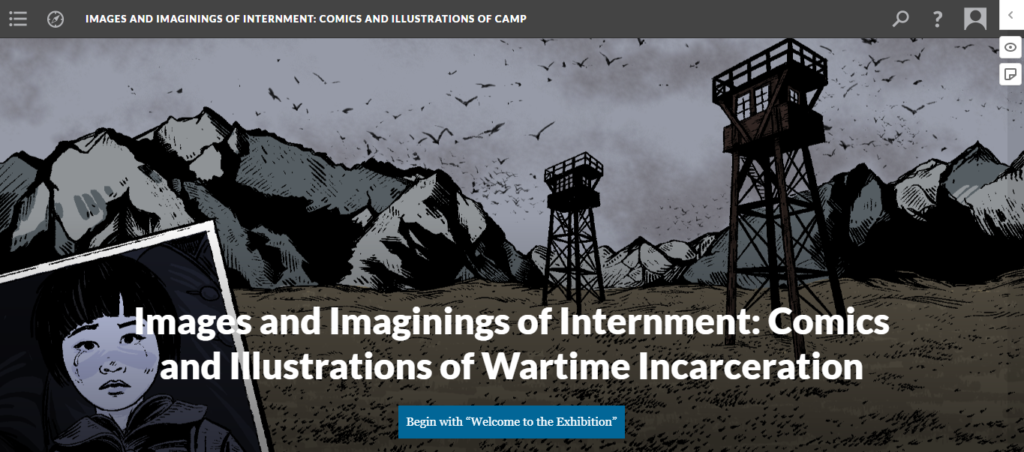Annie Tang, University Archivist, Leatherby Libraries
Special thanks to the exhibit project team for providing the information for the content of this writing.

About this Exhibition
In this exhibition, Images and Imaginings of Internment: Comics and Illustrations of Camp, patrons will learn about the Japanese American wartime incarceration and its legacy through images, mainly comics. Images are a good way to learn about incarceration because the government prevented incarcerated Japanese Americans from documenting their daily lives through film or photography. One of the only ways they could share their experience was through comics, art, and illustrations.
The images of incarceration created by Japanese Americans in camp were very different from the images created by those outside of camp. Artists outside of camp often used their art to try and justify the Japanese American incarceration. Looking at both of these representations helps us understand the Japanese American Incarceration experience and how such an injustice was allowed to happen.
This cross-campus exhibit physically lives on-site at Chapman University at Roosevelt Hall in the Wilkinson College of Arts, Humanities, and Social Sciences and in the Frank Mt. Pleasant Library of Special Collections and Archives at the Leatherby Libraries. The exhibit includes: vintage comic books, photographs, and personal memorabilia from the family of Project Director and Wilkinson College Associate Dean Stephanie Takaragawa; original items from the Munemitsu Family Collection, the Japanese American family associated with the California desegregation court case, Mendez, et al v. Westminster School District of Orange County, et al; and high-resolution reproductions from various historical repositories. The display will run from June to December 2023. Its counterpart, a digital exhibit and multimodal website lives online at: https://scalar.chapman.edu/scalar/internment-exhibit-test-book/index
Why Is This Project Important?
The images that surround us everyday shape who we are and how we interpret the world around us. Today, we see a lot of images through social media. During World War II, comics were one of the most popular forms of image consumption. Learning about the Japanese American Incarceration through comics allows us to understand how images both reinforced and challenged the narratives surrounding this significant moment in United States history. The power of images is something that we continue to grapple with today.
The comics in this exhibit are also important because they reflect how people of Asian descent were depicted before World War II and shaped how they continued to be depicted after. Looking at these images gives us a glimpse into the past, present, and future of representation.
The Team
Dr. Stephanie Takaragawa, Project Director. Stephanie Takaragawa is a cultural anthropologist whose areas of research include representations of the Japanese American internment, the anthropology of space and place, and the anthropology of visual communication. She has published broadly in visual culture, museums, and material culture in the Japanese American incarceration camps. She is a founding member of the curatorial collective Ethnographic Terminalia and has over ten years of exhibition and curation experience. She has curated exhibitions and installations at SOMArts (San Francisco), American Museum of Natural History (New York), Theaster Gates’ Arts Incubator (Chicago), Eastern Bloc Center for New Media (Montreal), and other museums and galleries. Her volunteer service includes Manzanar National Historic Site and the Japanese American National Museum.
Winston Andrus received his MA in War and Society from Chapman University. His thesis was on representations of war in the Golden and Silver Age of comics. His thesis and a scalar project he created about representations of war in comics, and about incarceration camps has been utilized in the 50 Objects/Stories Japanese American incarceration project.
Jessica Bocinski is the Registrar for the Escalette Permanent Collection of Art at Chapman University. She received her BA in Art History and Anthropology from Chapman University in 2018 before beginning her career as a museum professional. As Registrar, Jessica has focused on expanding the collection’s accessibility by creating virtual exhibitions on Scalar, building an online collection on eMuseum, and updating social media marketing strategies. Through improved inventory processes and object research, she has also supported the Escalette Collection’s goals of acquiring works by diverse artists and integrating those works into curated exhibitions throughout campus.
Dr. Rei Magosaki is a specialist in the field of twentieth- and twenty-first-century American literature and culture. Dr. Magosaki’s monograph, Tricksters and Cosmopolitans: Cross-Cultural Collaborations in Asian American Literary Production (Fordham UP, 2016), is the first sustained exploration into the history of cross-cultural collaborations between Asian American writers and their non-Asian American editors and publishers. She writes in both English and in Japanese, and her scholarly essays have been published in the U.S., Japan, India, and elsewhere. She is currently undertaking a project that involves all 10 Japanese American internment camps.
Dr. Jan Osborn is an Associate Professor of English and a specialist in rhetoric. Her work in discourse analysis is featured in her book Community Colleges and First-Generation Students: Academic Discourse in the Writing Classroom (2015). She is the faculty liaison for the Orange High School Young Writers’ Collaborative and the Orange County Literary Society Partnership. Dr. Osborn will provide insight into visual rhetoric, lending her expertise to contextualizing the role of comics in society, while providing connections of local area high schools and literacy programs.
Special thanks to Allison Devries, Manager of Grants Development and Administration for the Wilkinson College of Arts, Humanities, and Social Sciences and Dean Dr. Jennifer Keene for her support on this project.
